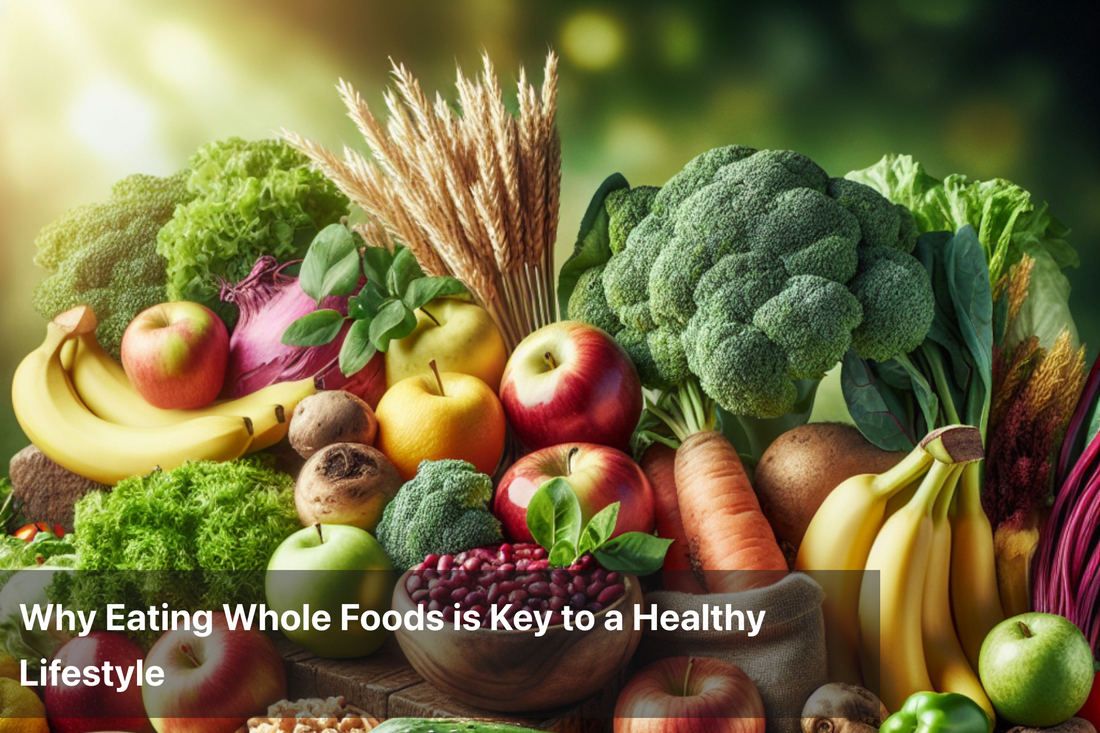
Why Eating Whole Foods is Key to a Healthy Lifestyle
Share
In today's fast-paced world, dietary choices significantly impact overall health and well-being. Emphasizing whole foods in one's diet is a foundational step toward achieving optimal health. Whole foods—natural, unprocessed, or minimally processed items—are rich in essential nutrients that support various bodily functions and protect against chronic diseases.
Understanding Whole Foods
Whole foods are foods that remain close to their natural state, free from added sugars, unhealthy fats, and artificial ingredients. Examples include:
Fruits and Vegetables: Apples, spinach, berries, carrots
Whole Grains: Brown rice, quinoa, oats
Legumes: Lentils, chickpeas, black beans
Nuts and Seeds: Almonds, chia seeds, flaxseeds
Lean Proteins: Eggs, fish, tofu
These foods are nutrient-dense, providing a plethora of vitamins, minerals, fiber, and antioxidants essential for maintaining health.
Benefits of Consuming Whole Foods
The advantages of incorporating whole foods into the diet are manifold. Below is a table summarizing key benefits:
Benefit |
Description |
|---|---|
Enhanced Nutrient Intake |
Whole foods are rich in essential nutrients like fiber, vitamins, and minerals, which are often lost during food processing. This ensures the body receives the necessary components for optimal functioning. |
Improved Digestive Health |
The high fiber content in whole foods supports a healthy gut microbiome, promoting better digestion and nutrient absorption. |
Reduced Chronic Disease Risk |
Diets rich in whole foods are associated with lower risks of heart disease, type 2 diabetes, and certain cancers, owing to their anti-inflammatory properties and absence of harmful additives. |
Weight Management |
Whole foods are generally lower in calories and higher in satiety, helping in maintaining a healthy weight without the need for restrictive dieting. |
Stable Energy Levels |
The complex carbohydrates in whole foods provide sustained energy release, preventing spikes and crashes associated with processed foods. |
Better Heart Health |
Nutrients like potassium, magnesium, and antioxidants in whole foods contribute to maintaining healthy blood pressure and cholesterol levels. |
Practical Tips for Including Whole Foods in Your Diet
Adopting a diet based on whole foods may seem daunting at first, but it can be simple and enjoyable with a few practical tips:
1. Make Simple Swaps
One of the easiest ways to incorporate whole foods is by swapping processed foods for their whole-food alternatives. For example:
Choose whole grain bread over white bread.
Opt for brown rice instead of white rice.
Replace sugary snacks with fresh fruit or nuts.
2. Focus on Whole Fruits and Vegetables
Aim to include a variety of colorful fruits and vegetables in your daily meals. Not only do they provide essential nutrients, but they also contain antioxidants that fight inflammation and boost immunity.
3. Plan Your Meals Ahead
Meal planning allows you to incorporate a variety of whole foods into your diet consistently. Preparing your meals in advance ensures that you are not tempted to reach for processed foods when you’re in a rush.
4. Cook at Home
Cooking meals at home allows you to control the ingredients you use, ensuring that they are whole foods. Consider trying simple, wholesome recipes like vegetable stir-fries, grain bowls, or baked salmon with roasted veggies.
Conclusion
Incorporating whole foods into your diet is a powerful way to support long-term health. These nutrient-dense foods are rich in essential vitamins, minerals, and fiber that support various bodily functions and prevent chronic diseases. By choosing whole foods over processed options, individuals can enjoy enhanced energy, better digestion, and improved overall health.
Eating a variety of whole foods, planning meals ahead, and cooking at home are simple yet effective strategies for maintaining a healthy, balanced diet. Remember, small changes can lead to big improvements in your health and well-being!
FAQs
1. What distinguishes whole foods from processed foods?
Whole foods are natural or minimally processed items that retain their nutritional integrity. In contrast, processed foods often contain added sugars, unhealthy fats, and artificial ingredients, which can detract from their nutritional value.
2. Can I still enjoy convenience while focusing on whole foods?
Absolutely. Many whole foods require minimal preparation. For instance, fruits, nuts, and yogurt are quick, nutritious options. Additionally, preparing meals in batches can provide convenient, whole food-based meals throughout the week.
3. Are whole foods more expensive than processed foods?
While some whole foods may have a higher upfront cost, they often provide more nutritional value per serving. Moreover, investing in whole foods can lead to long-term health savings by reducing the risk of chronic diseases.






